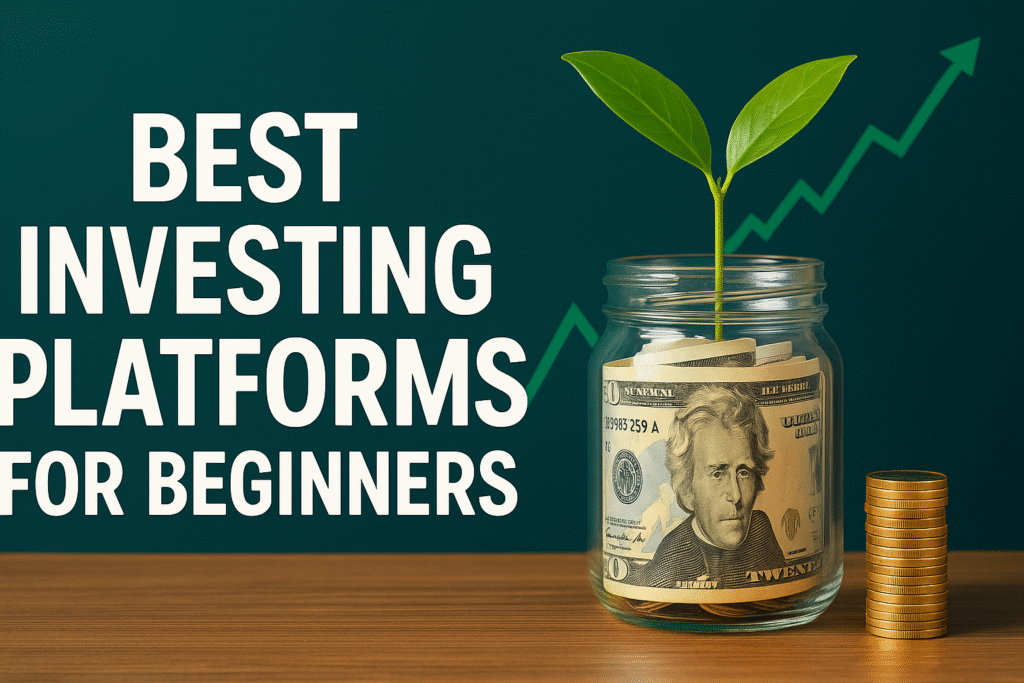Taking control of your financial future is one of the smartest moves you can make. However, reality soon sets in; choosing best investing platforms for beginners can make all the difference: the sheer number of investing platforms, apps, and brokerages is overwhelming. Acronyms fly (ETFs? IRAs? APYs?!), fees seem hidden, and the fear of making a costly mistake can feel paralyzing. Sound familiar?
You are not alone. Every successful investor started exactly where you are now: at the beginning, looking for the best place to plant that first financial seed.
The rightbest investing platforms for beginners are not necessarily the ones with the flashiest ads or the most complex tools. It is the one that meets you where you are: offering simplicity, low costs, solid education, and a user friendly experience that builds confidence, not confusion.
This guide cuts through the noise. We’ll explore the key factors beginners absolutely need to consider, and then dive into 5 top rated platforms specifically chosen for their beginner friendliness. By the end, you will have a clear understanding of where to open your account and take that crucial first step.
What Makes a Platform “Beginner-Friendly”?
Before we jump to specific names, let’s define what truly matters when you are just starting out:
- Low to Zero Fees: Beginners often start with smaller amounts. High fees can eat away at your returns before you even get going. Look for:
- $0 Commissions: Standard for most reputable platforms now on stocks, ETFs, and options trades.
- No Account Minimums: You should not need thousands just to open an account.
- Low (or No) Account Fees: Avoid platforms charging hefty annual fees just for having an account, especially for IRAs or smaller balances.
- Transparent Fee Structure: Hidden fees are a red flag. Everything should be clearly stated.
- User Friendly Interface & Experience:
- Intuitive Design: Can you easily find what you need? Is buying/selling straightforward?
- Mobile App Quality: Many beginners manage their investments primarily via a mobile app. The app needs to be reliable and easy to navigate.
- Simple Account Setup: Getting started should not require a finance degree or hours of paperwork.
- Robust Educational Resources: Knowledge is power! Look for platforms offering:
- Beginner Guides & Articles: Explaining core concepts (stocks, bonds, ETFs, mutual funds, IRAs).
- Videos & Webinars: Visual learning is often easier.
- Glossaries & FAQs: Demystifying jargon.
- Investment Research Tools (Simplified): Access to basic company data, news, and analyst ratings presented clearly.
- Fractional Shares: This is a GAME CHANGER for beginners. Instead of needing hundreds of dollars to buy a single share of a company like Amazon or Google, fractional shares let you invest any dollar amount (e.g., $25) into a piece of a share. This makes diversification (spreading your money) much easier with limited funds.
- Strong Customer Support: When you have questions (and you will!), You need accessible help. Look for multiple support channels (phone, chat, email) and good reviews about responsiveness.
- Security & Regulation: Nonnegotiable. Ensure the platform is a reputable, established brokerage registered with the SEC and a member of FINRA and SIPC (which protects your cash and securities up to $500,000, including $250,000 for cash claims, if the brokerage fails). FDIC insurance protects cash held in certain accounts (like cash sweeps) up to $250,000 per depositor, per institution.
The Top 5 Investing Platforms for Beginners
Based on best investing platforms for beginners the criteria above, here are five standout platforms consistently praised for welcoming new investors:
1. Fidelity Investments:
- Why is it great for beginners?
- Zero Commissions: $0 on online US stock, ETF, and option trades.
- No Account Minimums: Start with whatever you have.
- Excellent Fractional Shares (Stock Slices): Invest in thousands of stocks and ETFs with as little as $1.
- Outstanding Educational Resources: Fidelity Learning Center is packed with articles, videos, webinars, and courses tailored to all levels, especially beginners. Their content is clear and comprehensive.
- Powerful (but Navigable) Research Tools: Offers deep research for when you are ready, but the core interface is clean.
- Top-Tier Customer Service: Consistently rated highly for phone and online support.
- Automatic Investing: Easily set up recurring investments into stocks or ETFs.
- Strong Mobile App: Very functional and user-friendly.
- Cash Management: Uninvested cash is often automatically swept into FDIC insured accounts.
- Potential Drawback: The sheer depth of tools can feel slightly overwhelming at first glance, but the core buying/selling is very simple. They also offer mutual funds, some of which have minimums, but their $0 minimum index funds are excellent.
- Best For: Beginners who want a full service, highly reputable brokerage with top education, fractional shares, and excellent support from day one. Great for both “set it and forget it” investors and those eager to learn more.
2. Charles Schwab: The Education Powerhouse
- Why is it great for beginners?
- Zero Commissions: $0 on online US stock, ETF, and option trades.
- No Account Minimums: Easy entry point.
- Fractional Shares (Stock Slices): Invest in S&P 500 companies with as little as $5 per slice.
- Exceptional Educational Content (Schwab.com/learn): Their library is vast, well organized, and incredibly beginner friendly. Includes articles, videos, podcasts, webcasts, and even virtual workshops.
- Schwab Starter Kit™: A unique offering gets $101 of stock slices (in 5 companies) when you open an account with $50 or more. A fantastic, hands-on way to start!
- Reliable Customer Service: Known for strong support.
- Intuitive Platforms: Both the website and the mobile app (Schwab Mobile) are clean and easy to use.
- Automatic Investing: Available for ETFs.
- Banking Integration: If you open a Schwab Bank High Yield Investor Checking® account (requires a linked Schwab One® brokerage account), you get unlimited ATM fee rebates worldwide and no foreign transaction fees great for travelers.
- Potential Drawback: Fractional shares are currently limited to S&P 500 companies (though this covers most major stocks beginners are interested in). Their mutual fund selection is excellent, but some popular ones have minimums ($1, $100, $0).
- Best For: Beginners who prioritize top notch education and learning resources. The Starter Kit is a brilliant incentive. Ideal for those who might also value integrated banking.
3. Robinhood: The Mobile First Simplicity King
- Why is it great for beginners?
- Extreme Simplicity: The mobile app interface is arguably the most intuitive and visually appealing, designed specifically for ease of use. Buying and selling takes just a few taps.
- Zero Commissions: $0 on stocks, ETFs, options, and even cryptocurrencies.
- No Account Minimums.
- Fractional Shares: Invest in thousands of stocks and ETFs with as little as $1.
- Recurring Investments: Easily automate daily, weekly, or monthly investments into stocks or ETFs.
- Robinhood Gold (Optional): For $5/month, get access to margin trading (use borrowed money with extreme caution as a beginner!), larger instant deposits, professional research from Morningstar, and higher interest on uninvested cash. Not essential for core beginners.
- Potential Drawbacks:
- Limited Educational Resources: While improving, their educational content isn’t as deep or structured as Fidelity’s or Schwab’s.
- Basic Research Tools: Offers less fundamental research data compared to ful service brokers.
- Customer Service: Historically faced criticism for support delays during high volatility, though they have invested heavily in improvements.
- Focus on Trading: The simple interface can sometimes encourage more frequent trading than long-term investing, which is not always ideal for beginners.
- Best For: Beginners who prioritize a dead simple, visually engaging mobile experience above all else and want to start investing small amounts immediately with fractional shares. Great for those primarily focused on stocks/ETFs/crypto.
4. Acorns: The Effortless Saving & Investing Automator
- Why it’s great for beginners:
- “Set It and Forget It” Approach: Acorns focuses on automatic micro investing. Link your debit/credit cards, and it rounds up your everyday purchases to the nearest dollar, investing the spare change.
- Recurring Investments: Set up automatic daily, weekly, or monthly transfers from your bank account.
- Extremely Simple: The app guides you through a quick questionnaire to set your risk level, then handles the investing for you into pre built, diversified ETF portfolios.
- Low Barrier to Entry: Start investing with literally your spare change.
- Educational Content (Acorns Grow): Offers articles and videos on personal finance basics.
- Bonus Features: Includes Acorns Later (simple IRA setup) and Acorns Checking (debit card with fee-free ATMs, direct deposit features).
- Potential Drawbacks:
- Monthly Fee: $3/month for the personal plan (Invest, Later, Checking). While low, it can be a significant percentage of small portfolios (e.g., $3/month = $36/year on a $500 portfolio is 7.2%!). The fee becomes more reasonable as your balance grows.
- Limited Control: You choose your risk profile, but you can’t pick individual stocks or ETFs within your portfolio. It is a completely hands-off approach.
- Portfolio Options: While diversified, the portfolio choices are more limited than self-directed platforms.
- Best For: Beginners who want the absolute simplest, most hands-off way to start investing small amounts regularly without having to make investment decisions. Ideal for those who struggle to save consistently.
5. Webull: The Data Driven Beginner’s Playground (with Free Stock)
- Why it’s great for beginners:
- Zero Commissions: $0 on stocks, ETFs, options, and cryptocurrencies.
- No Account Minimums.
- Advanced Charts & Tools (For Free): Offers powerful technical analysis tools, level 2 market data, and customizable charts that are usually premium features elsewhere, great for beginners curious about learning more technical aspects.
- Fractional Shares: Invest with as little as $5.
- Free Stock Promotions: Often offers free stocks for opening and funding an account (terms apply).
- Paper Trading: A robust virtual trading simulator with $1,000,000 in virtual cash to practice strategies risk-free.
- 24/7 Trading: Offers extended hours trading (Pre Market & After Hours).
- Potential Drawbacks:
- Steeper Learning Curve: The interface, packed with data and tools, can feel overwhelming to a complete novice compared to Robinhood or Acorns.
- Less Comprehensive Education: While they offer some articles and videos, the focus leans more towards tools than structured beginner education like Schwab or Fidelity.
- Customer Service: Primarily app-based chat/email; phone support is limited compared to traditional brokers.
- Best For: Beginners who are tech-savvy, curious about learning technical analysis and market data, want access to advanced tools for free, and appreciate the incentive of free stock. The paper trading feature is a huge plus for learning.
How to Choose YOUR Perfect Platform:
Now that you have seen the top contenders, how do you decide best investing platforms for beginners? Ask yourself these questions:
- What is my top priority?
- Simplicity & Ease of Use: Robinhood or Acorns.
- Education & Learning: Fidelity or Charles Schwab (especially with the Starter Kit!).
- Hands-Off Investing: Acorns.
- Fractional Shares & Low Cost: Fidelity, Schwab, Robinhood, Webull all excel here.
- Exploring Tools/Data: Webull.
- How much money do I have to start? If it is very small ($50-$100), platforms with fractional shares and no minimums (all listed except potentially some mutual funds) are essential. Acorns lets you start with pennies.
- How involved do I want to be?
- Set it and Forget it (Passive): Acorns, or use automatic investing on Fidelity/Schwab/Robinhood.
- Learn and Choose (Active Learning): Fidelity, Schwab, Webull (paper trading).
- Simple Self-Directed: Robinhood, Fidelity, Schwab.
- Do I need guidance or research? Fidelity and Schwab offer the most robust, beginner-friendly educational libraries. Webull offers powerful tools but less structured education.
- How important is customer support? Fidelity and Schwab are generally considered leaders here.
Curious to learn more? Best investing platforms for beginners. Take a look at the video below, which shares some great insights and a fresh perspective that you might really enjoy.
Action Plan: Getting Started
- Define Your Goal: Why are you investing? (Retirement? House down payment? Building wealth? Learning?) This shapes your time horizon and risk tolerance.
- Set Your Budget: Decide how much you can comfortably invest regularly, even if it is small ($25, $50, $100 per month). Consistency is key.
- Pick Your Platform: Best Investing Platforms for Beginners. Based on your priorities and the comparisons above, choose one! Do not overthink it, the most important step is starting. You can always open another account later.
- Open Your Account: This usually involves:
- Providing personal info (Name, Address, SSN/ITIN).
- Answering some financial experience/objective questions (required by regulators).
- Linking your bank account for funding.
- Verifying your identity (often via micro deposits).
- Fund Your Account: Transfer money from your linked bank account. This usually takes 1-3 business days.
- Make Your First Investment:
- If using Acorns: Set up your round ups and/or recurring investments. Choose your portfolio risk level. Done!
- If using Fidelity/Schwab/Robinhood/Webull:
- Super Simple Start: Look for low cost, diversified ETFs (like ones tracking the S&P 500 tickers like VOO, IVV, SPY). Use fractional shares if needed. Buy a set dollar amount.
- Target Date Fund (in an IRA): If opening an IRA for retirement, a Target Date Fund (choose the year closest to when you turn ~65) is a fantastic hands-off option. They automatically adjust risk over time.
- Set Up Recurring Investments (Highly Recommended!): Automate your contributions. This builds discipline and leverages dollar-cost averaging (buying at different prices over time, smoothing out market bumps).
- Explore the Resources: Dive into the educational materials on your chosen platform. Start with the absolute basics.
- Be Patient & Think Long-Term: Investing is a marathon, not a sprint. Don’t panic over short-term market drops. Focus on consistently adding to your investments over the years and decades.
Bonus Tips for Beginner Success
- Start with an IRA for Retirement Goals: If your goal is retirement, open an IRA (Individual Retirement Account), either Traditional (tax-deductible now, taxed later) or Roth (post-tax money now, tax-free growth & withdrawals later). The tax advantages are powerful. Both Fidelity and Schwab make IRA setup very easy. Contribution limits apply.
- Focus on Diversification: Do not put all your eggs in one basket. ETFs (Exchange-Traded Funds) are an easy way for beginners to own hundreds or thousands of stocks or bonds in a single purchase. Index ETFs are particularly popular for low costs and broad market exposure.
- Beware of “Hot Tips” and Get-Rich-Quick Schemes: Stick to your plan based on education, not hype or FOMO (Fear Of Missing Out). If it sounds too good to be true, it probably is.
- Understand the Power of Compounding: Money you earn on your investments can earn money itself over time. Starting early, even with small amounts, gives compounding decades to work its magic. (Example: $100/month at 7% avg return = ~$113,000 in 30 years!)
- Don’t Try to Time the Market: It’s incredibly difficult, even for professionals. Time in the market is generally more important than timing the market. Consistent investing wins.
- Review Periodically (But Don’t Obsess): Check in on your portfolio quarterly or annually. Rebalance if necessary (selling some winners to buy more of what’s underweighted to maintain your target diversification). Avoid checking daily – it leads to emotional decisions.
For the investing Guide, also read the following blog.
How to Invest Smartly: A Beginner’s Guide to Growing Wealth
Conclusion:
Choosing best investing platforms for beginners is a significant step, but it doesn’t have to be scary. By focusing on beginner-friendly features like low costs, simplicity, education, and fractional shares, you can find a platform that empowers you rather than overwhelms you.
Whether you gravitate towards the all-around excellence of Fidelity, the educational powerhouse of Schwab (with that enticing Starter Kit!), the sleek simplicity of Robinhood, the effortless automation of Acorns, or the data-rich environment of Webull, you have excellent options designed to help you start small and grow confidently.
The most powerful investment you can make is in yourself, starting with the decision to begin. Open that account, make that first small investment, set up automatic contributions, and commit to learning. Your future self will thank you profoundly for taking this fearless first step today. The journey to financial empowerment starts right now. You’ve got this!
Ready to compare features side-by-side? Here’s a quick recap:
| Feature | Fidelity | Charles Schwab | Robinhood | Acorns | Webull |
|---|---|---|---|---|---|
| Best For | All-around | Education | Mobile Simplicity | Hands-off Automation | Data/Tools |
| Stock/ETF Commissions | $0 | $0 | $0 | N/A (Portfolio) | $0 |
| Account Minimum | $0 | $0 | $0 | $0 | $0 |
| Fractional Shares | Yes ($1+) | Yes ($5+ S&P) | Yes ($1+) | Yes (Auto) | Yes ($5+) |
| Recurring Investments | Yes | Yes (ETFs) | Yes | Yes (Core) | Planned |
| Beginner Education | ⭐⭐⭐⭐⭐ | ⭐⭐⭐⭐⭐ (Starter Kit!) | ⭐⭐ | ⭐⭐⭐ | ⭐⭐⭐ |
| Mobile App Ease | ⭐⭐⭐⭐ | ⭐⭐⭐⭐ | ⭐⭐⭐⭐⭐ | ⭐⭐⭐⭐ | ⭐⭐⭐⭐ |
| Customer Support | ⭐⭐⭐⭐⭐ | ⭐⭐⭐⭐⭐ | ⭐⭐⭐ (Improved) | ⭐⭐⭐⭐ | ⭐⭐⭐ (App/Chat) |
| Unique Perk | $0 Min Index Funds | $101 Stock Kit | Crypto Trading | Round-Up Investing | Free Stock + Advanced Tools |



